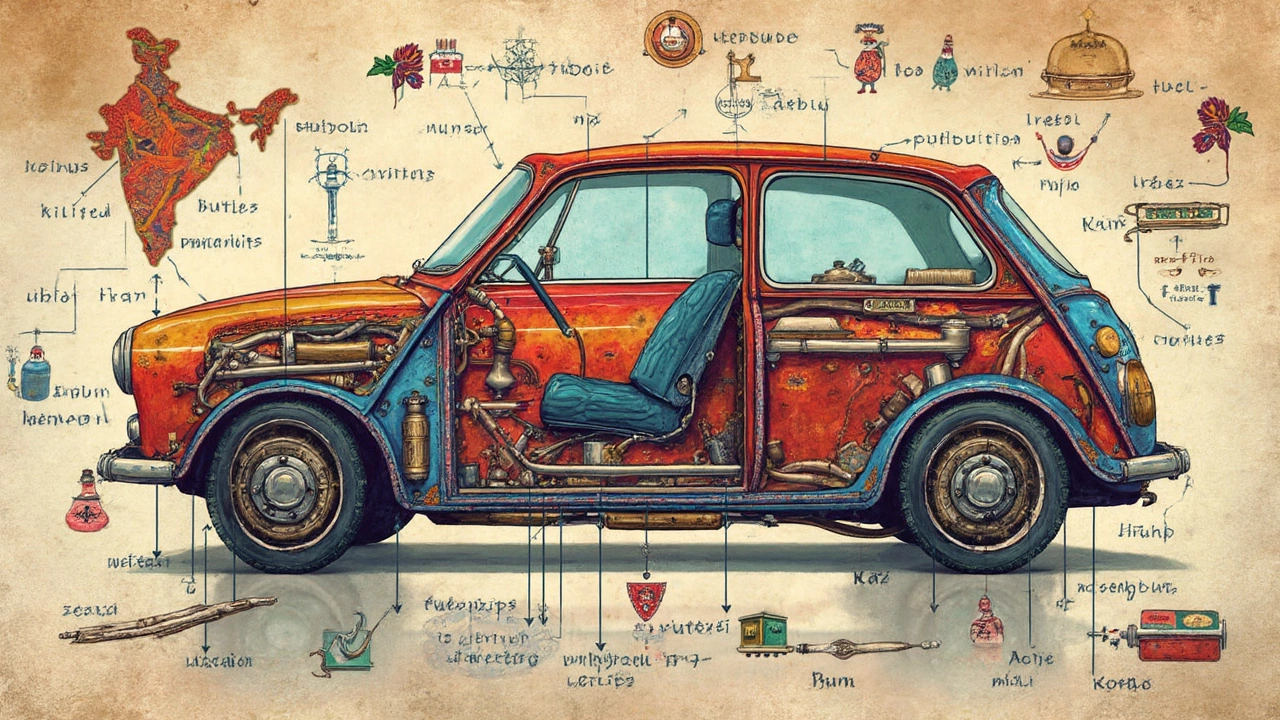 Feb, 25 2025
Feb, 25 2025
Picture this: you're cruising down the highway, tunes cranked up, and out of nowhere, your car starts to stutter. The dreaded fuel pump issue. Yep, it can happen suddenly. A fuel pump is like the heart of your car's engine, delivering fuel from the tank. But can it just stop working out of the blue? Absolutely.
First off, the fuel pump's job is crucial. Think of it like the messenger between your gas tank and engine. If this link drops, your car isn't getting power. But how can you tell if it's about to fail?
Watch out for warning signs: sputtering at high speeds, difficulty starting, or even stalling when your ride's at idle. Listening to your car isn't just about hearing that hum of the engine; it's about catching those subtle hints before you're caught off guard.
No one wants to deal with a breakdown, especially not due to something they could've spotted early. Regular maintenance checks, keeping your fuel tank at least a quarter full, and paying attention to how your car performs can all help you sidestep disaster.
- Understanding the Fuel Pump's Role
- Signs of a Dying Fuel Pump
- Reasons for Sudden Failure
- Preventative Maintenance Tips
- What to Do if Your Fuel Pump Fails on the Road
Understanding the Fuel Pump's Role
Alright, let's dive into what makes the fuel pump tick because, honestly, when it comes to your vehicle, this component is crucial. Think of it as the middleman—or, in this case, middle machine—that pushes fuel from your gas tank straight to the engine. Without it, your engine would be left gasping for, well, gasoline.
The working of a fuel pump sounds pretty straightforward, right? But this piece of machinery is doing a lot more than you might think. There are mainly two types of fuel pumps: mechanical and electric. Modern cars mostly use electric pumps as they are more efficient and reliable. They generate the right amount of pressure needed for fuel to reach the engine, without which the car doesn't run.
Key Functions of a Fuel Pump
- Maintaining the correct fuel pressure for optimal engine performance.
- Ensuring a continuous flow of fuel to the engine under any driving condition.
- Assisting in the regulation of your fuel injection system, which feeds fuel into the engine at precisely the right moments.
Wondering about how hard it works? Think about it this way. When you put your foot on the gas pedal, the fuel pump kicks into action. Whether you're idling at a red light or zooming along an open road, this pump keeps on pushing the right amount of fuel to keep your ride smooth and steady. Thanks to its efforts, you have the power when you need it.
An interesting tidbit: fuel pumps generally last around 100,000 miles. But that's in an ideal world. Factors like rough terrains, infrequent maintenance, and poor fuel quality can affect their lifespan.
Understanding Why Fuel Pumps Matter
In short, without a functioning fuel pump, you’re going nowhere fast—literally. It supports the tech in your car that's responsible for performance and fuel efficiency. This is why a failing pump isn't just an annoying issue; it's a showstopper.
Taking care of your fuel pump involves a bit of upkeep. Regular vehicle check-ups, keeping the fuel tank from going too low, and not ignoring early warning signs can keep you rolling without a hitch. So next time you start your car, remember, that little pump is gearing up to keep your engine singing!
Signs of a Dying Fuel Pump
When your fuel pump starts on its downhill journey, your car will send out distress signals. It's like it's trying to whisper, 'Help!' but are you listening?
Struggling to Start
Ever tried starting your car, and it just cranks over and over? A usual suspect here can be the fuel pump. It might not be sending enough fuel to get your engine up and running.
Random Stalls
No, your car’s not just fainting for attention. If it stalls out in the middle of a drive or at a stoplight, it could be the pump acting up. This happens when it's no longer keeping a steady flow of gasoline.
Poor Performance During Acceleration
Hit the gas and your car hesitates instead of zooming off? Uh-oh. This sluggishness can signal that the fuel pump can’t keep pace when you need more power.
Inconsistent Speed
If your car randomly surges forward or feels like it’s losing power unexpectedly, your fuel pump might be behind it. This jerkiness is often due to uneven fuel supply.
Fuel Tank Noises
Listen closely when you start the engine. If you hear a whining sound from the fuel tank, think of it as a plea for help — your pump may be under stress or beginning to fail.
Recognizing these signs early on could save you from being stranded. Keeping a keen ear and a watchful eye on how your car behaves can make all the difference. Don’t ignore these red flags; it’s cheaper in the long run to fix things at the first signs of trouble compared to dealing with full-on failure down the road.

Reasons for Sudden Failure
A sudden fuel pump failure can catch even the most vigilant driver off guard. But why do these crucial components sometimes give up without warning?
Debris and Contamination
Your car's fuel system isn't a sterile environment. Over time, dirt, rust, and other debris can accumulate in the fuel tank. When these particles slip through the defenses, they can reach the pump. Once inside, they're like sandpaper on the internals, causing rapid wear and tear or even a swift failure.
Electrical Issues
As much as mechanical wear, electrical failures pose a risk too. Often, wiring and connections can corrode or fail, particularly in older vehicles. A notorious culprit is the relay, which is like the light switch for your pump. If it shorts out, the pump may stop working instantly.
Overheating
No surprises here – overheating isn't just bad news for your engine; it's harsh on fuel pumps too. Running consistently on low fuel can leave the pump high and dry, without the gasoline it needs to cool down. An overheated pump can shut down unexpectedly.
Goldman Machinists, a well-respected auto repair guide, notes that "prolonged exposure to low fuel levels increases your pump's risk of overheating and sudden failure."
Factory Defects
Finally, occasionally you're just unlucky enough to get a dud right from the start. Manufacturing defects, though rare, do occur. This is part of why warranties and recalls exist – to catch those few errors that slip through.
Keep these points in mind, and you're less likely to find yourself stranded by a sudden failure. If anything feels off, a quick check-up with a mechanic could be the insurance you need to keep your vehicle humming smoothly.
Preventative Maintenance Tips
Keeping your car running smoothly is all about regular maintenance. A little work upfront saves you a lot of headaches later, especially when it comes to your fuel pump. So, how can you keep yours from suddenly giving out?
Regular Checks
Think of routine check-ups like doctor visits for your car. Pop the hood, peek around, and see if you notice anything off. Strange noises when you start up or while accelerating? Don't ignore them. They're your car's SOS signals.
Fuel Filter Changes
Regularly swapping out your fuel filter is a must. A clogged filter makes the fuel pump work harder, wearing it out faster. Aim to change your fuel filter every 20,000 to 40,000 miles. If you're unsure how to do it yourself, no shame in asking a pro for help.
Keep the Tank Full
Believe it or not, consistently running on low gas isn't just stressful for you. It's rough on your fuel pump too. Keeping at least a quarter tank full can prevent the pump from overheating and sucking up gunk from the tank’s bottom.
Fuel System Cleaner
Every now and then, throw in a bottle of fuel system cleaner into your tank. It's like a multivitamin for your car, cleaning out the nasties that might be lurking around. It's an easy, low-cost way to give your fuel lines and pump a little TLC.
Listen and Feel
Your car's telling you a story. Learn to listen. If acceleration feels sluggish, or you have trouble starting, your fuel pump might be on its way out. Catching it early can save you from being stranded on the side of the road.
Prevention really is better than cure, especially when it comes to avoiding unexpected breakdowns. Invest a bit of time now, and your future self will thank you when your ride keeps running smoothly.

What to Do if Your Fuel Pump Fails on the Road
So, your car just stalled, and you're pretty sure the fuel pump is the culprit. First things first, don't panic. Here's your game plan for this situation.
1. Safety First
The moment you suspect a fuel pump issue, turn on your hazard lights. It alerts others on the road. If you can, steer your vehicle safely to the side to avoid blocking traffic.
2. Assess the Situation
Try to restart your car. If it starts, chances are, the pump may be working intermittently. Don’t push your luck too much, though. Get to a safe location, like a nearby service station, if possible.
3. Get Help
If your car refuses to start again, it's time to call for help. Use a roadside assistance service or contact a local towing company. Having a phone with the numbers saved can be a lifesaver.
4. Communicate Clearly
When talking to a mechanic, mention the symptoms leading up to the breakdown. Knowing your car was sputtering or struggling to start before this can help diagnose the failure more accurately.
5. Prepare for Unexpected Costs
Fuel pumps aren’t cheap, and the labor can add up. Having a bit of money set aside for emergencies like this can ease the stress.
Being caught off guard is never fun, but knowing what to do when a fuel pump fails on the road can make all the difference. Keep calm, stay safe, and remember these steps.